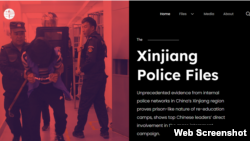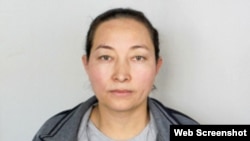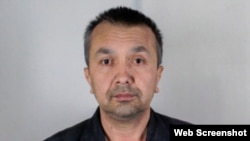A mystery has finally been solved for Anwar, a Uyghur American, who asked that only his first name be used for fear of "too much political attention."
Anwar said he had been "unable to speak or even just communicate" with his family in Xinjiang for five years. Then, he saw his cousin's mugshot in what is known as the Xinjiang Police Files, documents and images leaked from within China and released to the public last month by the Washington-based Victims of Communism Memorial Foundation and news media.
"I could only hope and pray for the best as I sat combing through each picture of the leaked Xinjiang Police Files," Anwar said.
Arzugul Abdurehim, cousin
After spending hours combing through countless images, Anwar found the face of his cousin, Arzugul Abdurehim, now 42, in the files.
"Anger, frustration, despair and anguish all bubbled up within me as I looked upon the mugshot of my cousin; I could tell she was handcuffed," Anwar said. "We had grown up together, and to me, she was my little sister. She was just a typical Uyghur mother, caring for her children and trying to provide them with the best."
Anwar's cousin was 39 when she was arrested for "reeducation" in 2018, according to the Xinjiang Police Files.
Anwar said he believes his cousin's crime was "her identity, that she is Uyghur."
"These pictures are only from 2018. The genocide has only gotten worse since then. I hope my other family members and loved ones are alive," Anwar said.
Metyar Ghopur, classmate
Mehmet Ali Sultan, a naturalized Uyghur American who has lived in the United States since 2011, also sifted through photos from the Xinjiang Police Files and saw familiar faces of Uyghur detainees from his hometown of Konasheher county. He found out his former high school classmate, Metyar Ghopur, was detained in 2017 by Chinese authorities.
"If it weren't for the leaked files, I would not have been able to learn of the arbitrary detention of my friend and former classmate," Sultan said in a phone interview with VOA.
"I filtered my search to only people over 30, saw a face I hadn't seen in over a decade, and recognized him immediately," Sultan said.
Ghopur's reasons "for internment" are described as "terrorism involving capital" and "digging into the expansion line."
"When I recognized his face, I was shaking and could barely hold back my tears," Sultan said.
The data within the files
Ghopur's and Abdurehim's images are two of thousands of photos taken at police stations and detention centers, including mugshots of more than 2,800 detainees. The cache of information hacked from a network of computers within Xinjiang is described by Victims of Communism Memorial Foundation as the "largest and most significant leak" so far.
The youngest Uyghur detainee in the files was 14-year-old girl when she was detained and the oldest, 73 years old.
In addition to photos, the leaked files include documents and speeches related to the Chinese government's mass detention of Uyghurs in Xinjiang, leaked to one of the foundation's researchers, Adrian Zenz. The foundation says the information has been authenticated and peer-reviewed by teams of researchers and investigative journalists.
"The person who unexpectedly reached out to the author to provide the files acted on a solely individual basis, attached no conditions to their provision or publication, and wishes to remain anonymous due to personal safety concerns," according to the Victims of Communism Memorial Foundation website.
Xinjiang Police Files revealed classified speeches by senior Chinese officials, internal police documents about protecting the detention camps, or what China's state media describes as vocational education and training centers.
A rule at the centers if "students" try to escape is to fire warning shots and then "shoot (them) dead" if they fail to comply, according to internal police documents from the leaked files.
Beijing, through its state media, has said in the past that the centers help students with their Mandarin language skills and give them vocational training. One center was described as similar to boarding schools where "students here go to class, play sports, and they go home once a week," reported state broadcaster China Global Television Network (CGTN) in 2019.
The Victims of Communism Memorial Foundation said the Xinjiang Police Files provided "a groundbreaking inside view of the nature and scale of Beijing's secretive campaign of interning between 1-2 million Uyghurs and other ethnic citizens in China's northwestern Xinjiang region."
"This is an unprecedented cache of documents directly from Xinjiang police computer servers," said Andrew Bremberg, president of the Victims of Communism Memorial Foundation and former U.S. ambassador to the United Nations in Geneva.
"This was a hack, in fact not a leak, that someone kind of smuggled out but a hack of tens of thousands of documents that provide the most in-depth understanding of what is actually happening in Xinjiang over the last several years," Bremberg told VOA.
China's response
When asked about the legitimacy of the leaked data during a regular Chinese Foreign Ministry news conference on May 24, spokesman Wang Wenbin said the files were "the latest example of the anti-China forces’ smearing of Xinjiang."
"The lies and rumors they spread cannot deceive the world, nor can they hide the fact that Xinjiang enjoys peace and stability, its economy is thriving and its people live and work in peace and contentment," Wang told the press in Beijing.
The United States, some other Western countries and human rights groups have accused China of committing genocide and crimes against humanity against Uyghurs and other Turkic ethnic groups in Xinjiang. Beijing has repeatedly called the accusations lies and has denied abuses.
VOA Pashto Service's Shaista Lami contributed to this story.
Editor's note: VOA took all precautions before posting photos from the Xinjiang Police Files website used for this story.






